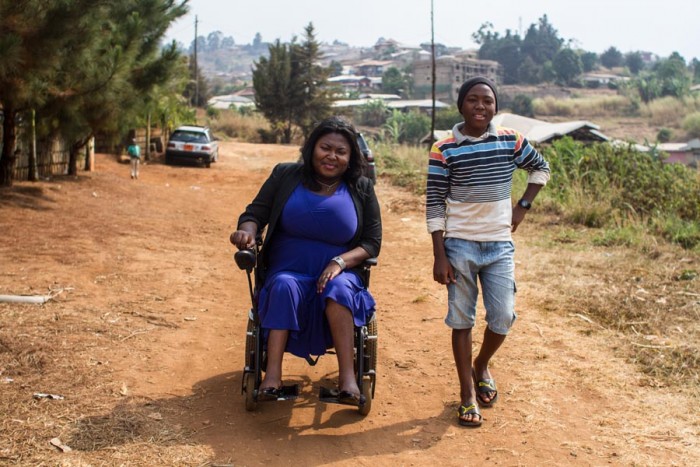June 29th, 2015 by Rachel | Tags: Disability, Peace Corps | No Comments »

A blind teacher and blind students present their walking sticks, an incorrect form of tool to help them navigate the world.
When most persons with disability in Cameroon are the poorest of the poor, most are unable to not only treat their condition but also acquire devices that would help them lead an easier life and also leave their homes. Even when if they are able to acquire a device, they are often not given the most appropriate device. When they are given the wrong device, many can still face dangers when using the wrong device and/or still lack independence.
One of the most common problems I frequently encountered in Cameroon is that many blind people use a walking stick instead of a white cane. When I visited a blind school in a village, I found that all blind people who had a device had a wooden walking stick. The blind teacher said that while the wooden walking stick did help them navigate, they still faced dangers because people would mistake them for people with mobility disability. So, drivers will sometimes drive by them and nearly hit them as the drivers don’t realize they can’t see to move out of their way.
When people have mobility issues in both the legs and arms are given manual wheelchairs, they still face lack of independence as they have to rely on someone to push their wheelchair everywhere they go. Power wheelchairs are unfortunately almost non-existent in Cameroon. Hilda Bih, a Cameroonian radio journalist based in Bamenda who who has muscular dystrophy, is fortunate to have a power wheelchair because she traveled to the US a year ago for the first time for Mandela Washington Fellowship and had the opportunity to purchase a power wheelchair and bring it back to Cameroon. Before she went to the US, she was using a manual wheelchair and relied on her family members to push her to places. Hilda told me that the power wheelchair has given her so much independence that she can now commute to and from home and work on her own which she couldn’t do before going to the US.

Hilda Bih takes a stroll independently with her brother on an unpaved road.
Deaf and hard of hearing often have issues in receiving quality hearing aids when they are able to obtain them. Many of those who do have the fortunate to receive hearing aids often get standard ear molds instead of custom-made ear molds. Using standard ear molds do not allow them to hear to their fullest potential, and they also often get feedback sounds. Some also receive hearing aids that are not powerful enough for them to fully understand speech.
While there is the issue of acquiring correct devices, many persons with disability are actually not aware that devices that would improve their quality of life, do exist. When I asked all 150 persons with disability for my Community Needs Assessment if they are aware that there were services for acquiring devices, half responded that they were not aware. According to another study done by a PhD student, Islay Mactaggart, at London School of Hygiene & Tropical Medicine who recently completed her thesis on people with disability in Northwest, only 24% of persons with disability in Northwest region were aware that devices exist. This situation certainly does explain one of many reasons why so many persons with disability never leave their homes.






